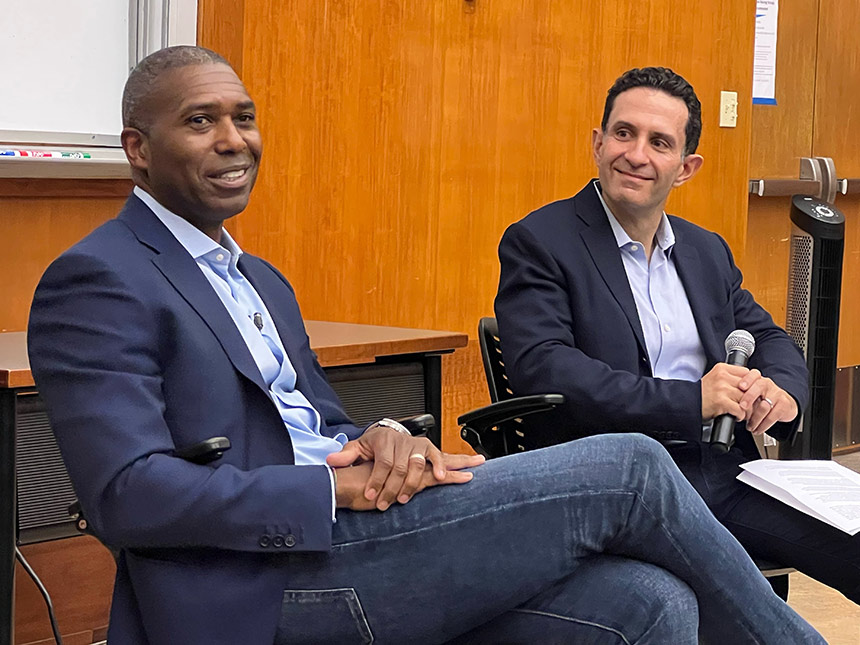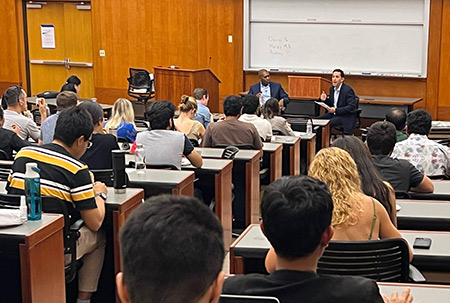
By Andrew Cohen
Tony West didn’t mince words about what he walked into on his first day at Uber in November 2017.
“As one of our executives described the situation, it was a dumpster fire,” he said during a recent Leadership Lunch Series event at Berkeley Law, presented by the school’s Berkeley Center for Law and Business.
Public allegations of sexual harassment of female employees. A challenging legal landscape with numerous suits against the company. Investigations by several law enforcement agencies.
West was Uber CEO Dara Khosrowshahi’s first hire after taking the reins in 2017.
“I was tasked with not only cleaning up the legal docket, but also to help change the culture,” said West, Uber’s senior vice president, chief legal officer, and corporate secretary. “We needed a very clear organizing value, and that value was doing the right thing, period. It very much became the north star to guide the company and how employees approached their jobs.”

Interviewed by Berkeley Law Professor and corporate law expert Stavros Gadinis, West told a packed lecture hall of students that mastering the law is only part of an attorney’s job.
“Anyone can sit on the sidelines and watch the house burn, but it takes a firefighter to jump in and improve the situation,” West said. “Don’t just think of yourselves as technical experts in the law, but as people who will be able to improve institutions even when it’s hard — maybe even especially when it’s hard.”
Before and after his time as a partner at Morrison & Foerster, West spent 11 years as a U.S. Department of Justice lawyer under two different administrations — serving as Associate Attorney General — the department’s third-ranking official, before returning to the private sector. He was PepsiCo’s executive vice president for public policy and government affairs, general counsel, and corporate secretary for three years before joining Uber.
Head on a swivel
Based in San Francisco, the driving and delivery platform now operates in more than 70 countries and 10,000 cities on six continents. Leading Uber’s global legal, compliance and ethics, security, and cybersecurity functions, West readily admitted the challenges are omnipresent.
“It’s important to appreciate the differences in culture across the jurisdictions we operate in and to understand the regulatory landscape in play,” he said. “There’s a lot of gray out there. We welcome competition but strive for a level playing field.”
During the discussion and an ensuing Q&A session hosted by the Berkeley Business Law Journal, West urged the students to be proactive rather than passive:
“Just because something is legal doesn’t make it right,” he said. “I look for people who have the courage to exercise good judgment, even in situations where it’s hard to do that. There can be external pressures or internal pressures pushing against that, but it’s important not to think of your job as just simply trying to execute on the technical legal answer.”
Emphasizing the importance of acting with transparency, integrity, and accountability, he described needing to model those values at Uber right away.
“I learned that we’d had a data breach the year before and failed to disclose that to regulators,” West recalled. “So instead of spending my first day finding where the bathroom was and meeting with colleagues, I was calling every state attorney general saying, ‘I have something I need to disclose to you.’ It was important to model for the company what ‘doing the right thing’ looked like in practice. You can’t simply say it — you have to show it.”
Safety measures
Early during the COVID-19 pandemic, Uber allocated $50 million to provide health and safety supplies to drivers around the world; implemented a “No Mask, No Ride” policy for both riders and drivers, along with mask verification technology; and provided financial assistance for drivers and delivery people who were diagnosed with COVID–19.
“All those requirements are risky from a legal environment given that drivers are independent contractors and as such, we can’t tell them how to do their job,” West said. “But we made decisions, knowing we could incur legal risk and that we might get sued — and we did. The reason we did it is that it would have been completely irresponsible and unsafe for people to drive around without those measures in place. It was legal for us to say, ‘Drive how you want,’ but not the right thing to do from an integrity standpoint.”
He said in 2018, Uber became the first major tech company to end mandatory arbitration for individual claims of sexual assault or harassment by riders, drivers, or employees, as well as the use of mandatory confidentiality agreements in such cases — a practice Congress made illegal for all private companies earlier this year.
West added that Uber met and partnered with over 200 women’s and anti-sexual violence organizations that guided changes in its own internal policies and processes; developed a uniform system that enables businesses and organizations to consistently count and categorize sexual misconduct reports; and encouraged the company to proactively release the industry’s first U.S. Safety Report including data on the most serious safety incidents reported on the platform.
With the pandemic putting workplace flexibility front and center, West said Uber caters to that mindset. He noted that independent surveys show how flexibility is the main draw bringing drivers to the platform, and that roughly half of them drive less than 10 hours a week.
“When I came of age, if you wanted to work you had to get up and be at a certain place by a certain time,” he said. “Working at a law firm often meant ‘face time’ — being in the office so that others could see you were busy, whether you really needed to be there to get your work done or not. But things have changed fundamentally now, and I believe that’s a good thing. We’ve seen that you can sustain high levels of productivity with a flexible workplace model.”
West touted how litigation skills are transferable to many lines of work, helping to both unravel complex matters and learn how to convey them in an accessible way. In the end, though, he stressed that it all comes down to people and teamwork.
“That’s the biggest thing,” he said. “I work hard to surround myself with colleagues who are smarter than I am in certain areas, who can see what I can’t see, who can complement my weaknesses with their strengths, and who are comfortable being bold with their recommendations. That helps the individual and the company as a whole.”